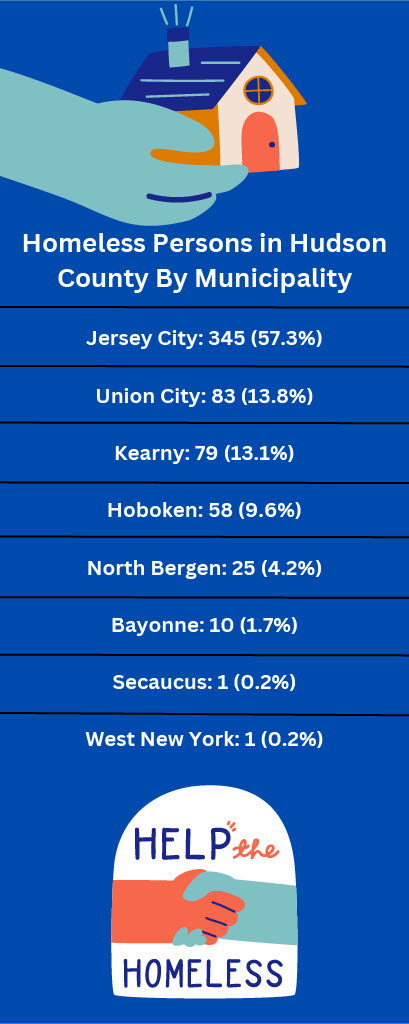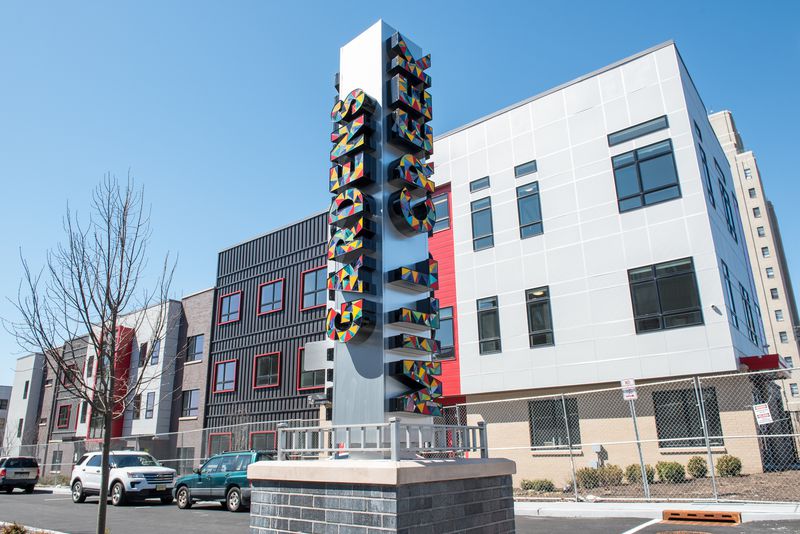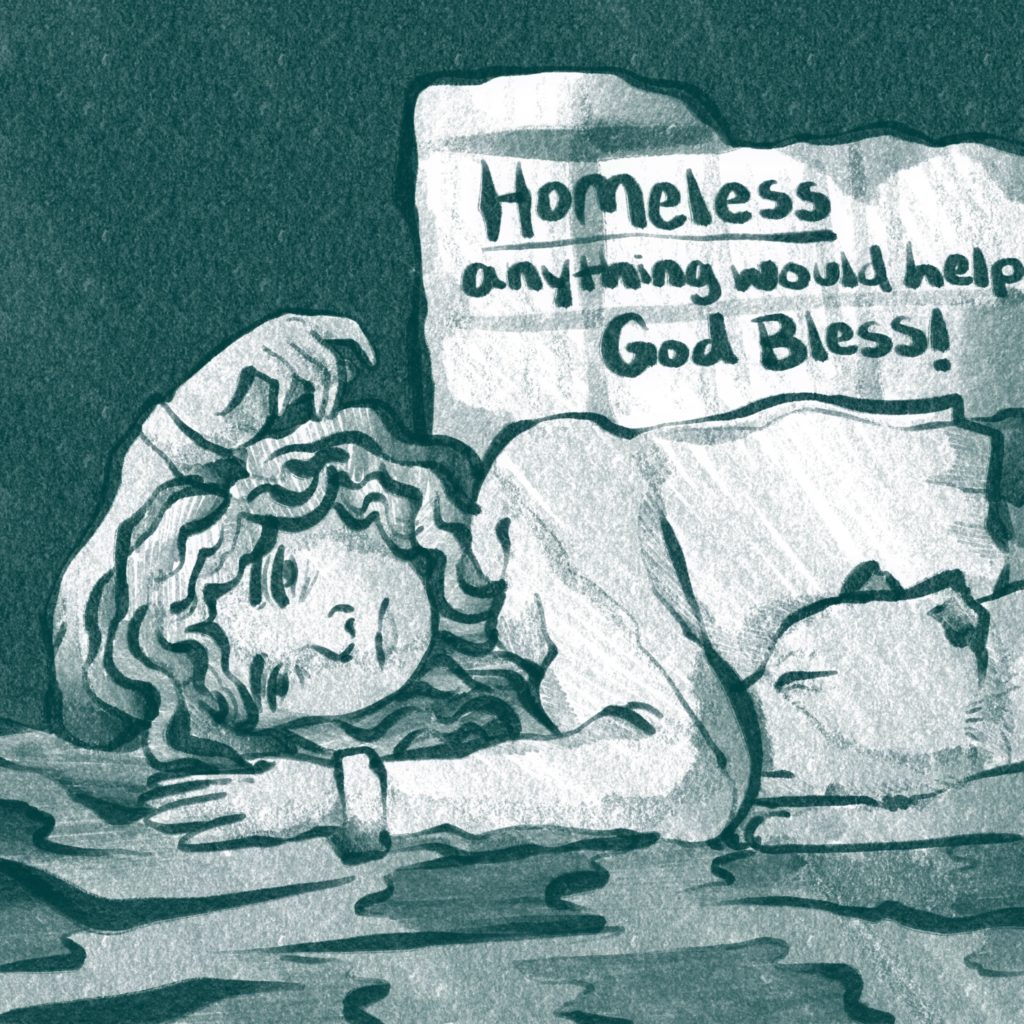Illustration by staff illustrator Sakura Siegel.
Homelessness is a problem that affects almost all urban areas of the United States. One may think that is especially true in Hudson County, as it is one of the most densely populated counties in the country, with a population of over 700,000 people.
The county is also home to many low income families, and with rising costs of living, many residents find themselves struggling and without a home. However, despite this, the level of homeless within the county has seen a decrease within the past few years.
According to a report from Monarch Housing Associates from late 2022, the amount of homeless in the county went from 882 in January 2021 to 665 in January 2022. This occurred while homelessness increased in the state as a whole, going from 8,057 in 2021 to 8,754 in 2022 within that same time frame.

This has been widely attributed to the county’s distribution of emergency housing vouchers (EHVs), from both the federal government and the state.
Hoboken is a Hudson County municipality with a sizable homeless population, however Jaclyn Cherubini, feels that the county has made great strides in the past decade.
“Hoboken has been held in high esteem for having the most affordable housing per capita,” Cherubini said. “I have been really proud of Hudson County for getting Project Based Vouchers for Section 8 housing, we have over 500 of these vouchers in the county.”
Cherubini is the Executive Director of the Hoboken Shelter, which has been around for over 41 years, and serves showers and meals for those who are without a home.
In February of 2023, it was announced that seven housing authorities in Hudson County will share $22.4 million from the federal Department of Housing and Urban Development (HUD) in order to modernize and improve public housing properties. This is about 25% of the $93.8 million HUD awarded to more than 50 public housing authorities across the whole state of New Jersey.
“The funds I helped secure in the fiscal year 2023 federal funding bill will provide safe housing for millions of New Jerseyans across the state,” Menendez said in a public statement that same month.
Jersey City, which has the highest rate of homelessness in the county, has also been making an effort to increase the number of affordable housing units. Housing is considered affordable when a household spends no more than 30% of its income on rent, according to Jersey City’s government website. HUD defines the Fair Market Rent (FMR) for Jersey City.
The city joined the HUD’s House America program in 2021, and since then it has provided housing to nearly 1,500 families in need, and has added an increase of 3,500 affordable housing units to the City’s pipeline.
“Affordability has been my priority from the start, especially as Jersey City is experiencing an explosive renaissance like no other in the region, and the Housing America Program has helped build upon our efforts to ensure our neediest families and residents are afforded the quality housing they deserve, regardless of their income,” Mayor Fulop said in a Feb. 16 statement.

“Fulop Administration has taken aggressive steps to preserve and expand affordable housing more than anywhere else in New Jersey with our most recent efforts ranging from creating Jersey City’s first affordable housing ordinance and adding more affordability requirements with the Overlay Program to acquiring the first new 40-unit public housing building in over 80 years and increasing on-site affordability to the largest mixed-income community in the region at Bayfront,” Jersey City Press Secretary Kimberly Wallace-Scalcione told Slice of Culture.
Bayonne is a municipality with a relatively small homeless population, however, even they have been working diligently to provide care for those in need of shelter.
“The Bayonne Housing authority has done an incredible amount of rehousing people and upgrading our affordable housing,” said Bayonne Law Director Jay Coffee.
“We do not have a large homeless problem, but the Bayonne community is very caring. For those who are homeless, we know where they are and what they are doing, and we try to help as best as we can.”
In New Jersey, the standards to affordable housing varies, but usually, households must have earnings that are at or below the 80% median family income (MFI) for the county of where the housing is located. Some housing programs for specific areas could be for households with earnings at or below 30 to 50% MFI.
The state has a webpage dedicated to further information, resources and more.
https://www.instagram.com/p/Cr4btgQAc-P/
We want to hear from you! Please help us better serve you and our community by taking this short survey.



 Get your slice of culture from NJ
Get your slice of culture from NJ Hudson County born & raised
Hudson County born & raised The Locals + The Culture
The Locals + The Culture “Best Grassroots Journalism” @njspj + @njcivicinfo grantee
“Best Grassroots Journalism” @njspj + @njcivicinfo grantee






 We stopped by Excel
We stopped by Excel










 E
E













